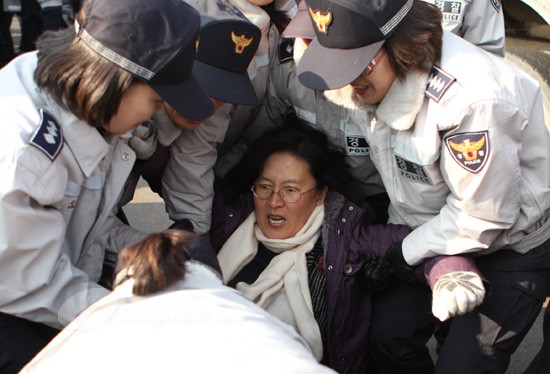
On 10 August, protestors clashed with 200 riot police during demonstrations against the building of a naval base on Jeju Island in South Korea. More than 94% of the people of Gangjeong, the site of the proposed military base, are opposed to the planned base, and protests over the past months have seen thousands occupy and rally on the streets to halt the construction of what is widely recognised to be another base for US imperialism in the region.
Plans were announced in June 2007, when it was proposed to create a 53 hectare naval base outside Gangjeong Port, costing $914.4 million. This was confirmed with the signing of a memorandum of understanding between the Jeju Island provincial government and the Ministry of National Defense in April 2009. Construction of the site has been contracted out, with substantial contracts awarded to the Samsung and Daelim consortiums, working on phases 1 and 2 of the base respectively. These are two of the notorious chaebol, Korean monopoly giants developed and nurtured with cheap government financing and protected markets under the auspices of successive US/British-backed South Korean dictators.
Despite a lack of explicit confirmation from both Seoul and Washington, the base is expected to host US and South Korean Aegis destroyers, equipped with missile defence systems, and will play a crucial role in military encirclement of China. Since the outbreak of the Korean War in 1950, the US has held a permanent military presence in the south of the Korean peninsula, including some 28,500 US troops stationed in military bases strategically placed along the northwest coast near China and the DPRK.
Opposition to the plans organised very rapidly, with protestors holding demonstrations, rallies and occupations around and on the site of the proposed base. The police response has been brutal, with hundreds of activists having been arrested for peaceful protest against the construction. The Grand National Party, the imperialist-backed ruling party, has been eager to criticize and red-bait demonstrators, with ex-floor leader Kim Moo-sung declaring opposition to the base to be ‘pro-North activity’. Right wing groups, such as the reactionary Korean Veteran’s Association, have taken to the streets, harrassing demonstrators on the Island.
Jeju Island holds particular importance for the Korean people in the struggle against US imperialism. Between 1948 and 1953 the South Korean government, under the leadership of the US-backed President Syngman Rhee, committed massacres to destroy a communist uprising on the island, murdering as many as 60,000 people – 1/5 of Jeju’s population. Successive US and British backed military dictatorships would rule South Korea until the late 1980s, although much of the repressive apparatus still remains; as recently as 1 August, a South Korean navy instructor was indicted under the National Security Law for using teaching materials including Lenin’s Imperialism: The Highest Stage of Capitalism, and a paper on Kim Il Sung’s role in the anti-Japanese guerilla struggle.
Updates on the struggle against the military base can be found at http://nobasestorieskorea.blogspot.com/
Jack Thomas




